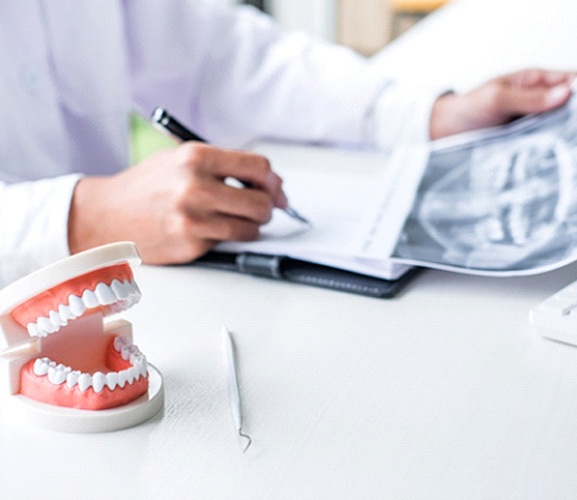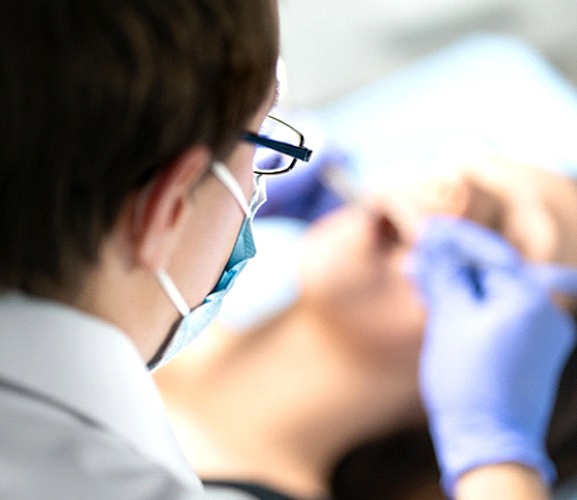Tooth Extractions – Dallas, TX
Safe Tooth Removal from a Trusted Team
Our dental team here at Avion Dental & Orthodontics does everything possible to help patients maintain their long-term oral health and protect the natural teeth they have. Unfortunately, there are some instances where a tooth removal is the best option going forward, even though it’s always considered a last resort for our dentists. If you’d like to learn more about the process and why you have nothing to fear when it comes to getting treatment completed, please give us a call and we’ll determine if an extraction is the best solution for your dental problem.
Why Choose Avion Dental & Orthodontics for Tooth Extractions?
- Sedation Dentistry Available for Nervous Patients
- Simple Tooth Extractions Made Affordable
- Same-Day Care for Emergencies
Why a Tooth Extraction May Be Necessary

There are many instances where a tooth may need to be extracted. The most common reason, however, is due to severe damage caused by decay or physical trauma, such as a bad fall or sporting injury. In other cases, we may recommend tooth removal if a tooth has become impacted, which is when it becomes trapped underneath existing teeth as it erupts (common for wisdom teeth).
Other reasons we extract a tooth include the following:
- Ensure a restoration can be placed (such as a denture)
- A baby tooth is not falling out on its own
- To make orthodontic treatment possible
- To prevent infections and other oral health problems from spreading or causing problems later
The Tooth Removal Process

Ahead of performing your tooth extraction, we’ll carefully plan each phase of treatment and confirm what type of extraction is needed beforehand. This ensures the procedure is as comfortable and predictable as possible.
To remove teeth, we first need to administer local anesthetic so that no sensation is felt during the actual procedure. Removing the tooth starts with breaking it from the periodontal ligament, which is gently done using a dental elevator. This rocks the tooth back and forth, making it easy to grab and take out using a pair of dental forceps. Once carefully removed from the mouth’s connective tissue, we’ll ask you to bite down onto a gauze pad so the socket can begin the healing process.
Aftercare for a Tooth Extraction

The most important thing you can do during aftercare is to keep the extraction site clean. Not only will this prevent an infection from developing, but it will also speed up the healing process. You should make sure to get plenty of rest on the day of treatment and take all medications prescribed by our office. Do not smoke or use straws for at least the first 48 hours after treatment. Once 24 hours have passed, you should rinse your mouth with salt water (which is about 8 oz of warm water and half a teaspoon of salt) to keep it clean. When sleeping, keep your head elevated, which can easily be done by stacking multiple pillows to prop yourself up.
Understanding the Cost of Tooth Extractions

A tooth extraction is never the first option of your dentist, but sometimes one is needed to preserve the health of the rest of your smile. If you think that you may benefit from a tooth extraction, it’s important to think about the cost. We won’t be able to tell you the exact price of your procedure until after we take a closer look at your troublesome tooth. Until then, here are some things to keep in mind.
Factors That Can Affect Tooth Extraction Cost

Once we have taken a look at your smile, we can determine the cost of your extraction. Here are the main factors that will play a role:
- Location: The type and location of the tooth that needs to be pulled will influence the cost of your extraction.
- Quality: The more teeth that need to be extracted, the more your treatment will be.
- Complexity: Some extractions are more complicated than other ones. This will contribute to the cost. For instance, an impacted tooth extraction tends to have a higher cost when compared to a simple tooth extraction.
Does Dental Insurance Cover Tooth Extractions?

It is common for dental insurance to cover approximately half of your treatment after you have met your annual deductible. However, there may be limits in place that cover only up to a certain number of teeth or a waiting period before your coverage kicks in. Each plan is different, so it is important that you confirm this with your dental insurance provider ahead of time. If you need any additional help understanding your benefits, don’t hesitate to ask us!
Other Options for Making Tooth Extractions Affordable

If you don’t have dental insurance, this doesn’t necessarily mean that you will be left completely on your own. Our patients have the option to break up the cost of their treatment into manageable installments with CareCredit or in-house financing. We offer a variety of plans and payment schedules, so talk to one of our friendly team members if you have any questions or concerns regarding the cost of your treatment.
To find out exactly how much you can expect your tooth extraction to cost, give us a call. We’re happy to help you get some relief!
Tooth Extractions FAQs
Does Getting a Tooth Pulled Hurt?
Before the procedure, your mouth will be numbed with a local anesthetic by our dentist. It will help you feel comfortable during the extraction, and you shouldn’t notice any pain! Plus, dental sedation is available if needed. However, expect some soreness and discomfort in the first few days following the extraction. You can easily manage your symptoms by diligently following the aftercare instructions given. Taking proper care of your mouth after extraction will promote faster healing and lower your risk of infection. If your pain worsens or you exhibit other symptoms like developing a fever, contact our office right away for assistance.
How Should I Prepare for My Tooth Extraction?
Preparing for your tooth extraction is just as important as taking the right steps for recovery after the procedure. Before your extraction, we’ll answer any questions you have and explain how you can prep for your appointment. Our team here at Avion Dental & Orthodontics will provide you with specific instructions like only drinking water or picking up prescription medication. Make sure you have arrangements for someone to drive you home after the appointment since you’ll likely receive local anesthesia.
What’s the Recovery for Tooth Extractions Like?
Once the procedure is complete, your emergency dentist in Dallas will give you a list of aftercare instructions. These are designed to help you prevent infection and heal comfortably. Some vital best practices are getting plenty of rest, keeping your mouth clean, sticking to soft foods, not spitting, and refraining from tobacco use. To keep discomfort at bay, you can place a cold compress against the outside of your cheek for 10 minutes at a time and take over-the-counter pain relievers as instructed. Around the three-day mark, you should begin to feel better.
What Are My Options for Replacing a Missing Tooth?
Filling the gap in your smile following a tooth extraction is essential for both appearance and function. For this reason, we will recommend a dental bridge, dentures, or dental implants. While dental bridges can replace 1-4 teeth, they need to be in a single row for this tooth-replacement solution. Partial and full dentures are a tried-and-true choice that can address moderate or severe tooth loss but cannot stimulate your jawbone to prevent bone loss. Fortunately, dental implants can effectively replace one, a few, or an entire arch of teeth. Since the implant posts are inserted directly into the jawbone, they are incredibly lifelike, extremely stable, and can last for 20-plus years with proper care.
